Top 10 Switzerland Culture, Customs and Etiquette
Should you remove your shoes when visiting friends? Should you greet those on elevators with a smile? When thinking about the dos and don'ts in your own ... read more...nation, these questions might not seem like the most obvious ones, but things that you might not even consider at home can have a major impact abroad. Here is a list of Switzerland's Culture, Customs and Etiquette.
-
Swiss traditional attire is adaptable and might alter significantly or very slightly from canton to canton. The term "national costume" actually refers to the traditional costumes worn by peasants, who donned clothing that was distinctive to the surroundings of the area. However, the attire of the Swiss nobility did not considerably differ from that of the nobility of the surrounding countries.
In the majority of the nation, Swiss men have traditionally dressed simply and ordinarily. Men who live in hilly areas choose leather shorts since they make mobility easier while trekking, climbing, hunting, etc. In the lowland regions, men dress in shirts with long sleeved jackets, breeches or pants with woolen tights or stockings, and a hat.
Swiss ladies typically wear bright skirts with puffed sleeves, which are quite feminine. Complementing the outfit are ornate headpieces, laced aprons, bonnets, and embroidered bags. Another look combines a corset with an apron and a full-length skirt. Such outfits are accompanied with colorful, chic jewelry.
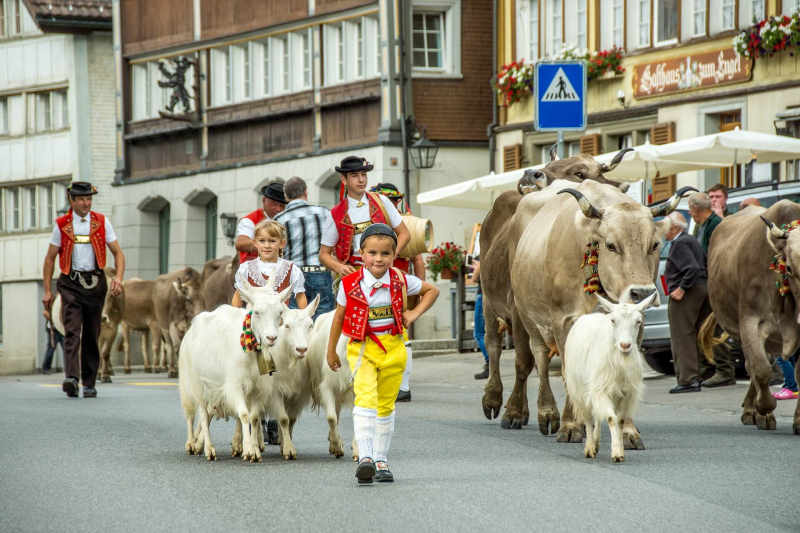
https://studyinginswitzerland.com 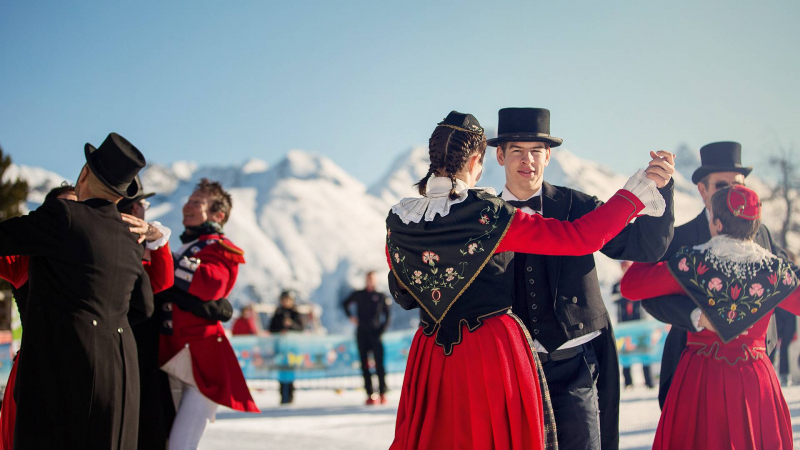
https://www.swiss.com/ -
Famous composers from Switzerland include Othmar Schoeck, Arthur Honegger, and Frank Martin. Andreas Vollenweider, a different musician and composer from the country, has received Grammy honors from around the world for his skill in harp music. International classical music is honored in the Switzerland-based Lucerne and Verbier Festivals. Another well-known music festival that takes place in the nation is the Montreux Jazz Festival. A Swiss folk metal band with international acclaim is called Eluveitie.
In the past, only exceptional occasions were allowed for public dancing in Switzerland. However, regulations significantly relaxed after World War II, and dancing quickly gained popularity as a pastime in Switzerland. The Swiss enjoy both modern dance forms like breakdancing, salsa, and rock and roll as well as more traditional dances like the waltz, foxtrot, and polka. The Trachtenvereine organisations perform these dances at folk festivals and other cultural events, contributing to the preservation of the nation's folk dances.
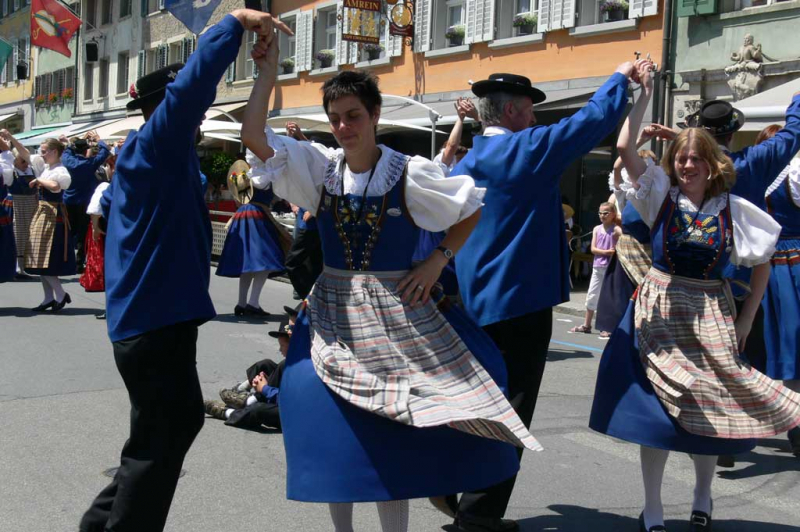
https://www.lebendige-traditionen.ch 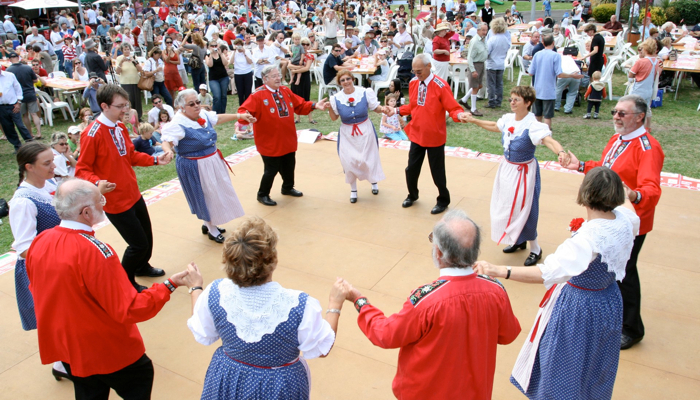
https://www.pinterest.com/ -
Since there is no official language of Switzerland, the majority of its literature is published in French, German, Romansch, or Italian. Some of the well-known Swiss writers include the novelist Robert Walser, the essayist Peter Bichsel, the playwright Friedrich Dürrenmatt, and the novelist and travel writer Annemarie Schwarzenbach. Hermann Hesse from Switzerland and Carl Spitteler from that country each received the Nobel Prize in Literature in 1919 and 1946, respectively.
In the 16th century, Protestantism had a big impact on Switzerland's visual arts landscape. Internationally renowned Swiss painters include Paul Klee, Alberto Giacometti, Jean Tinguely, who created moving sculptures out of garbage, and Samuel Hieronymus Grimm, an ink wash and water color artist. Early in the 20th century, the country was also the birthplace of the Dada movement. The nation is home to several art museums that house sizable art collections.
Chip carving is a well-liked style of art in Switzerland and is used to adorn common objects. Country homes frequently have wood carvings added to them to improve their appearance. Woodcarving is another method used to make ornamental figurines. Additionally well-known, Swiss embroidery is frequently used to adorn national costume. Swiss watches are well-known across the world, and the major Swiss watch companies offer extremely expensive timepieces. Watchmaking is a significant sector in the nation.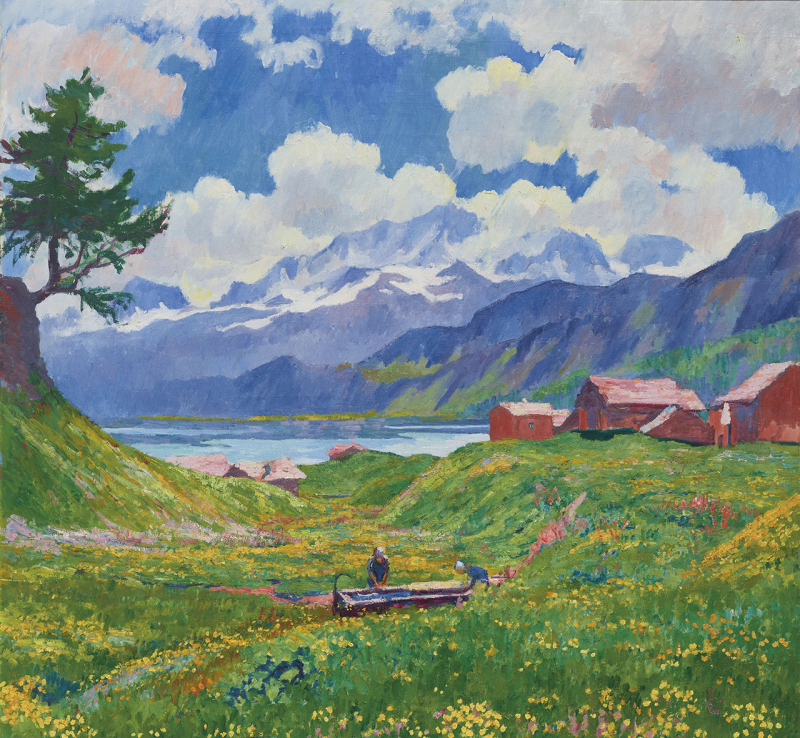
https://artdependence.com/ 
http://www.artisticnetwork.net/ -
The majority of the population in Switzerland has a high level of living, making it one of the richest countries in the world. The country has a sizable middle class that is wealthy. However, only 20% of the nation's wealthiest individuals possess 80% of the private assets.
The roles of men and women in Swiss society have historically been firmly delineated patriarchal societies. However, in current times, these distinctions have been steadily fading. The bride and groom must both agree to the marriage in order for it to take place nowadays, and cohabitation before getting hitched is typical. In Swiss society, divorce and remarriage are also common.
Although female empowerment and education are still behind those of men, things are slowly changing. Modern Swiss households are nuclear in nature, notwithstanding the size of traditional Swiss houses. In Swiss culture, it is assumed that one will behave politely and with respect for others' privacy.
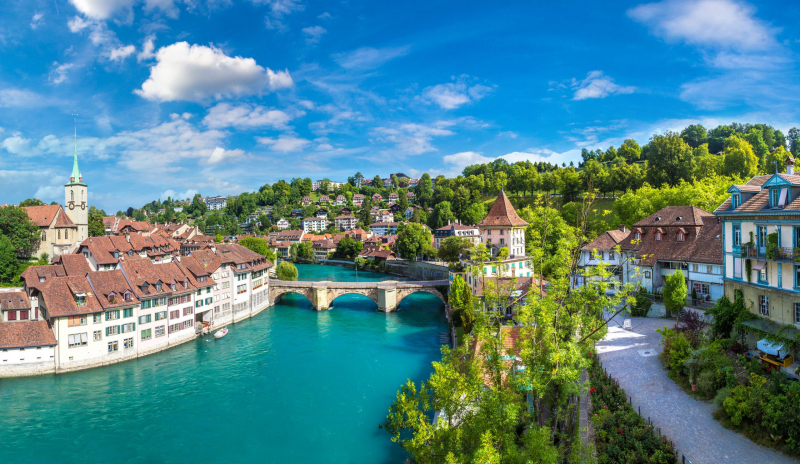
https://www.journeyz.co 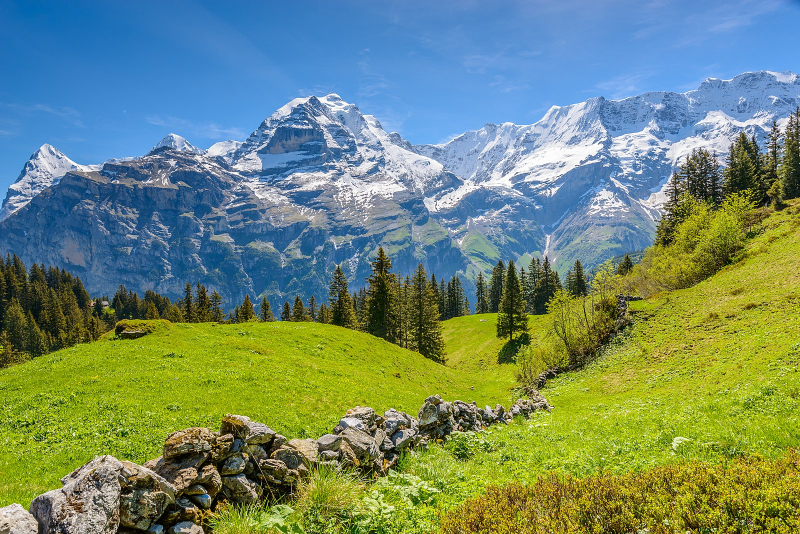
https://www.kimkim.com/ -
Switzerland's federal state has no official religion. According to the national survey of the Swiss Federal Statistical Office, 61.2% of the resident population (aged fifteen and over) identified as Christian in 2020, of which 33.8% were Catholics, 21.8% were Swiss Protestants, and 5.6% were adherents of other Christian groups. Since 1980, when they made up roughly 94% of the population, the percentage of Christians has considerably decreased.
In the same period, the population of non-affiliated Swiss citizens has increased from 4% to 31% and that of followers of non-Christian religions has increased from 1% to 7%. Church registries show that in 2020, the Catholic Church of Switzerland had 35.2% of the resident population as registered members, while the Protestant Church of Switzerland had 23.3%.
The Swiss cantons observe many holidays and festivals. Christian feast days and holidays are widely observed across the country. On August 1st, the nation-wide secular holiday known as "National Day" is honored.

http://www.gpsmycity.com/ 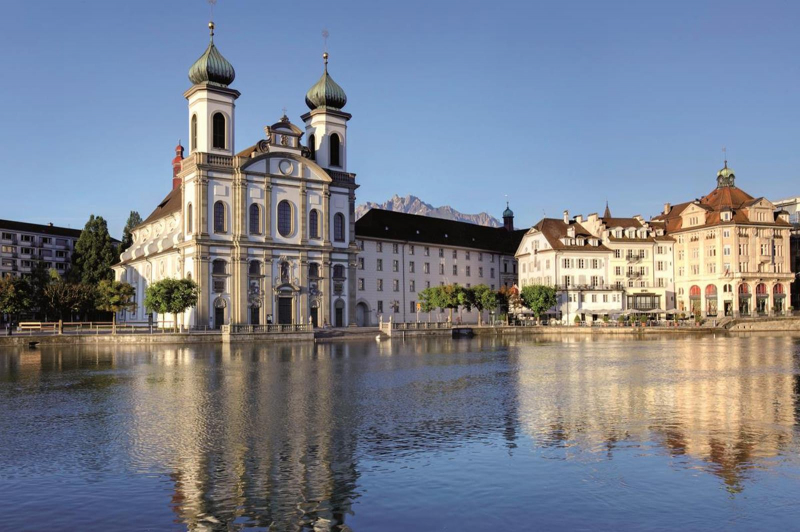
http://religioustravelplanningguide.com -
The majority of Swiss citizens actively participate in sports as part of their daily lives. The most widely played sports in the nation are football and ice hockey. Several significant international sporting occasions, including the FIFA World Cup of 1954 and the Winter Olympic Games of 1928 and 1948, were held in Switzerland.
The nation's winter sports facilities draw tourists and athletes from throughout the world. Curling, ski jumping, competitive sledding, and alpine skiing are some of the well-liked athletic activities available in Switzerland. International mountaineers travel to Switzerland to engage in mountain climbing. As of 2017, the nation had hosted the Ice Hockey World Championships ten times and has 12 ice hockey teams that make up the National League.
Switzerland's national football squad has previously competed in two UEFA European Championships and seven FIFA World Cups. The nation has a lengthy history of basketball game participation and houses the FIBA headquarters. Another well-liked sport in Switzerland is rugby.
Tennis players from Switzerland, including Martina Hingis and Roger Federer, are renowned for their outstanding performances. Racing, cycling, golf, and sailing are some of the other major sports practiced in Switzerland. The Steinstossen (competition of stone throwing), Schwingen (Swiss wrestling), and Hornussen are among the classic sports of Switzerland (influenced by both golf and baseball).

https://www.houseofswitzerland.org/ 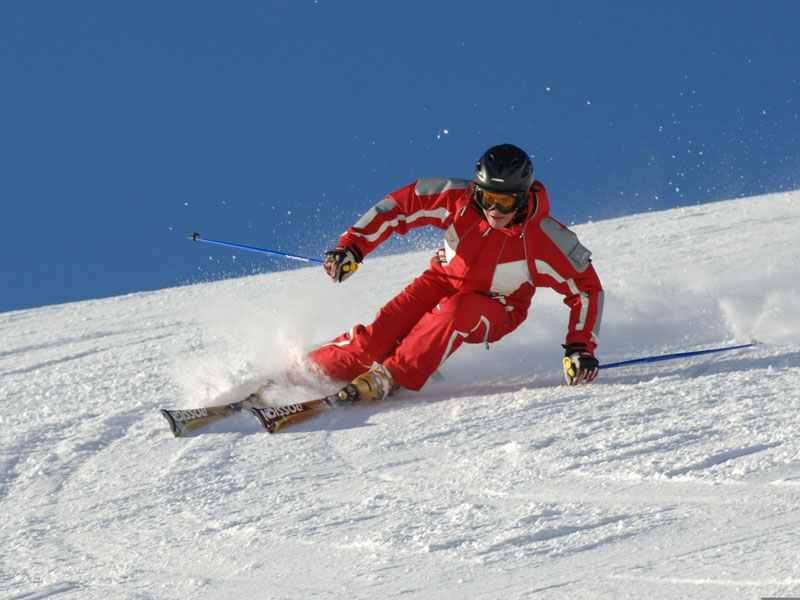
https://planforeurope.blogspot.com/ -
The Swiss shake hands at introduction, but friends greet one another with three cheek kisses (right, left, and right) When you enter and exit a store, you should greet the staff with a smile. Being late is disrespectful, and punctuality is crucial.
In Switzerland, neighbors respect one another. This can go too far; for instance, several cities have designated party houses in the woods where individuals can organize gatherings so they don't make noise in their homes and possibly disturb their neighbors.
Littering is discouraged, recycling rates are high, and everyone is encouraged to contribute. Sundays are especially sacred; in order to avoid disturbing the neighbors, it is banned to use a washing machine or a lawnmower. Keep in mind that many hotel or hostel concierges have experienced frustration when international guests request to wash their clothing on a Sunday. It is a citizen's duty to remove snow and ice off their walkways throughout the winter to prevent accidents. It is the duty of the other neighbors to clear their paths if the neighbor is frail or ill.

https://switzerlandtravelcentre.com/ 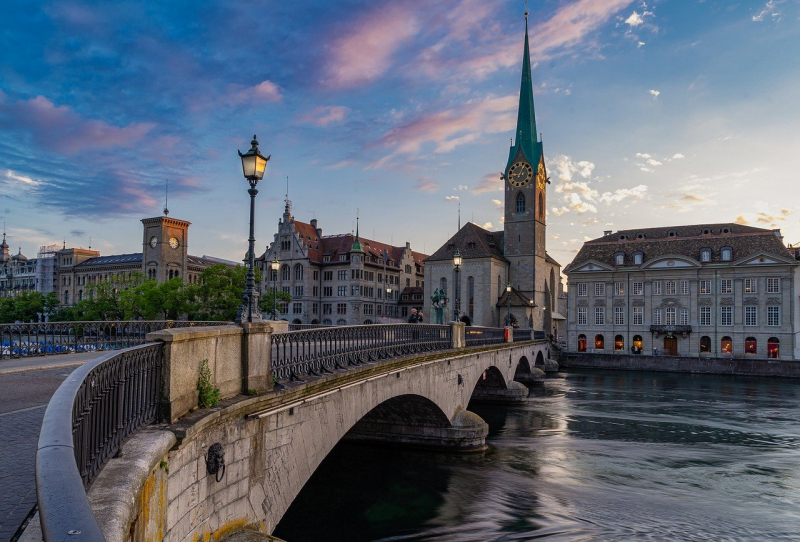
https://aljawaz.com/ -
Between strangers, the customary handshake with open eyes and a grin is sufficient. As a relationship progresses, air-kissing on both cheeks and a slap on the back between men are frequently included. You might kiss three or twice, depending on the locality. If you're unsure, we advise that you kiss three times. Unless otherwise requested, we advise you to refer to your Swiss colleagues by their polite or official titles.
Although titles are not a big deal to the Swiss, doing so at the beginning is advised out of politeness. Use Monsieur (male) or Madam (female) in the French-speaking Switzerland, Herr (male) or Frau (female) in the German-speaking Switzerland, and Signore (male) or Signora (female) in the Italian-speaking Switzerland (female). Unless speaking to young female teenagers or youngsters, avoid using the pronouns Fräulein, Mademoiselle, and Signorina. The use of these phrases to refer to adult women has decreased over time.

https://www.newlyswissed.com/ 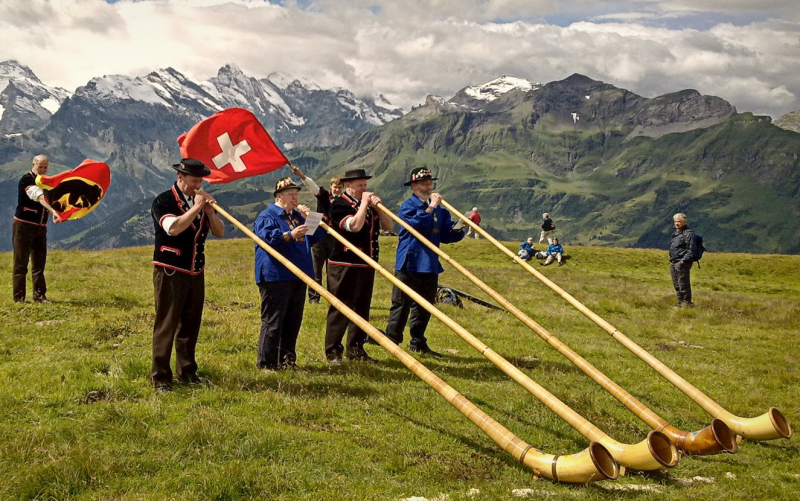
https://etiquipedia.blogspot.com/ -
If you are asked to your Swiss counterpart's home for dinner, try to appear on time or a little early because punctuality is prized. Bring presents, such as wine or chocolates, if you are invited to a meal. Until you are requested to sit down, keep standing. You might be directed to a certain seat. It is customary to begin meals with "bon appetit" or "guten appetit."
Prior to starting your meal, wait for everyone to be served and your host or hostess to introduce themselves. Continental table manners dictate that the knife should be held in the right hand while eating and the fork in the left. Toasts are customary; be sure to raise your glass with each other's and make eye contact while doing so.
Please avoid resting your elbows on the table. A lunch in Switzerland typically includes cheese. If you are given round cheese, slice it thinly from the center. When finished, parallelise your cutlery and plate. You should finish everything on your plate because in Switzerland, wasting food is frowned upon.

https://studyinginswitzerland.com/ 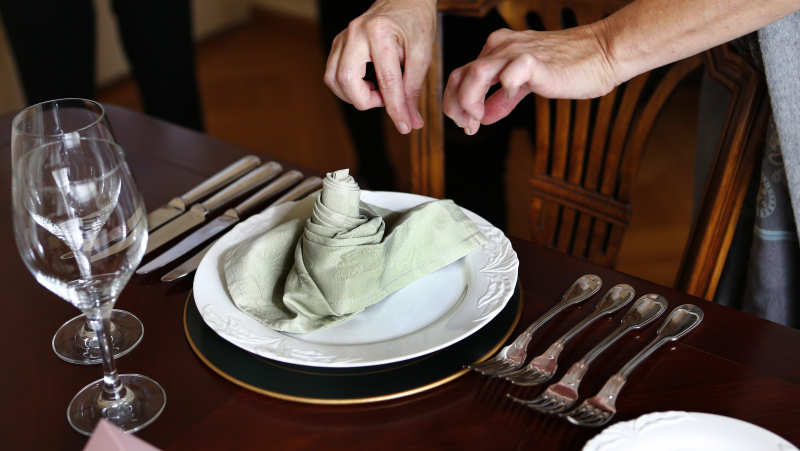
http://smapse.com/ -
Being respectful of someone or anything means learning their native tongue. Even though English is widely spoken in Switzerland, making an effort to communicate in the local tongue is always welcomed (particularly in the French-speaking region of the nation).
It's usually courteous to inquire about their language proficiency before striking up a conversation. Try to at least learn the words for "Hello," "Goodbye," "Please," and "Thank You" in the language of the area you will be visiting. Another useful sentence is "I would like to..." It is typically advised to try speaking German rather than Swiss German if you are in the German-speaking part of Switzerland.
When the German-Swiss realize they are speaking to a foreigner, they practically instinctively switch to German. You can employ formal and informal forms of the word in German, French, and Italian, which alter the conjugation of the verb you use and occasionally phrases. For instance, the formal equivalent of don't worry about it in French is ne vous en faites pas, but the informal equivalent is ne t'en fais pas.
The formal is used to express respect to those who are older than you, whom you view as superiors, who hold positions of authority over you at work, or even just random strangers on the street. With intimate friends, relatives, and peers, the casual is employed.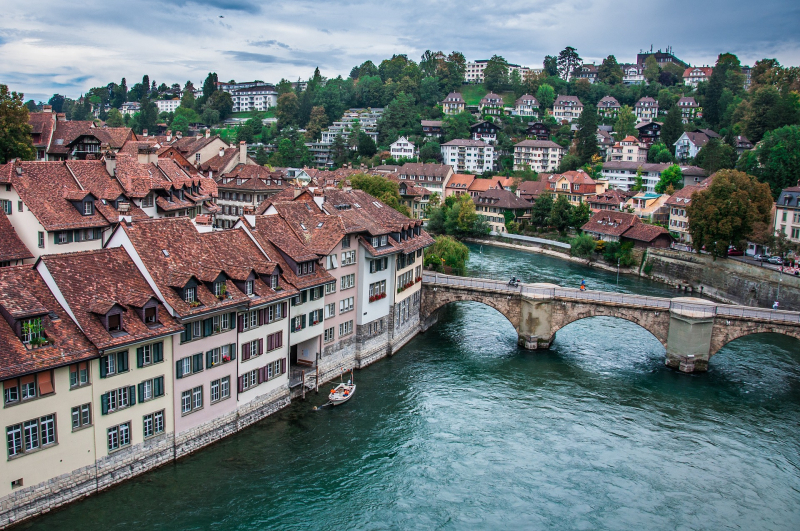
http://theculturetrip.com 
https://travelnoire.com/































